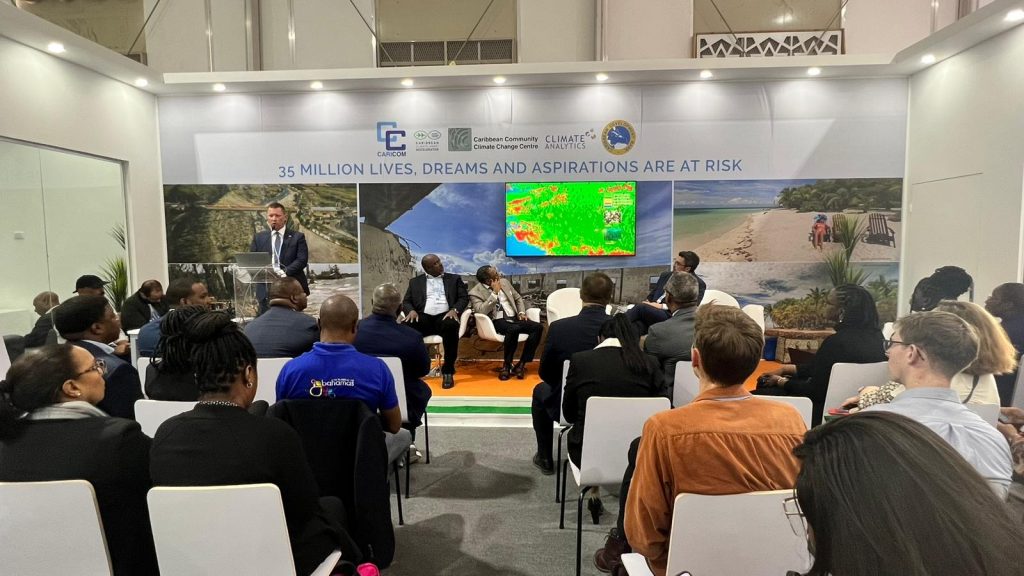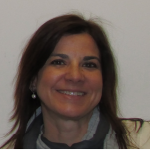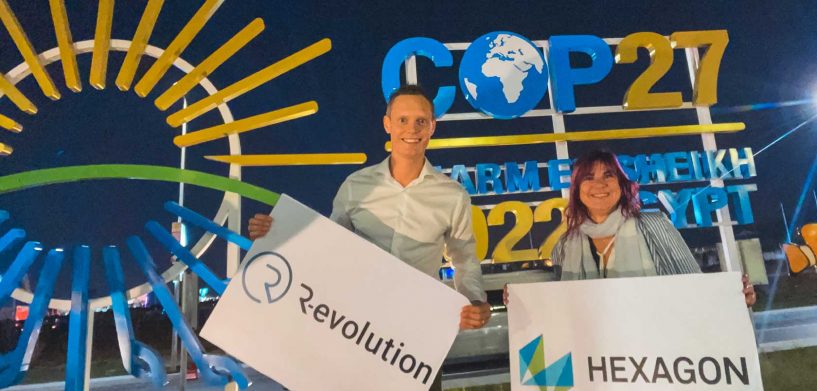By Erik Josefsson and Begoña Verdejo
As a company whose vision is “empowering an autonomous, sustainable future,” Hexagon keeps a close watch on events related to sustainability. This year’s 27th Conference of the Parties to the United Nations Framework Convention on Climate Change (COP27) was no exception.
Hosted at the Egyptian coastal city of Sharm el-Sheikh, the convention was a collaboration between government and business, who met to discuss solutions for global sustainability challenges. EDGE Pro for Information Systems, an Egyptian geospatial company and Hexagon partner, was one of the businesses that participated in COP27.
EDGE Pro and Hexagon have a relationship that goes back more than a decade, and the company is quickly expanding its reach across Africa and Europe. As representatives of R-evolution and Hexagon’s Safety, Infrastructure & Geospatial division, we were honoured when EDGE Pro invited us to attend COP27 as their guests.
The first thing we noticed when we arrived in Sharm el-Sheikh was the effort that had been made to ensure the city was greener. In addition to a focus on electrical and natural gas-powered transportation, new bicycle highways could be seen when travelling to the expo centre.
Representatives from 190 nations attended COP27, and more than 90 of these hold leadership positions in their home countries. All were at COP27 to discuss how to accelerate mitigation actions for the climate crisis. Knowing the seriousness of the discussion at hand was a powerful experience.
We joined EDGE Pro at their space in the Green Zone, which was open to the public and hosted exhibitions, events, workshops and much more.
As one of the only geospatial companies in the Green Zone, we shared how our sustainable solutions allow organisations to capture data from different databases and services and consolidate it to generate useful information. Then using analysis tools, such as artificial intelligence, organisations can simulate different scenarios to determine the best path to address climate-related challenges.
Geospatial tools can also be used for real-time monitoring to determine if sustainability efforts are successful. For example, Hexagon’s solutions were used to analyse Sharm El Sheikh’s progress as they implemented green initiatives to create a more eco-friendly community. Officials could easily view the amount of oxygen and carbon dioxide levels in particular areas through different time frames to evaluate progress. These tools are also used to catalogue newly planted trees in an effort to see how much renaturation was generated.
We also had the opportunity to showcase how R-evolution is bringing together cutting-edge technology, industry-leading companies and sustainable business opportunities to save our planet. One area of focus was our work in renewable energy sources, such as wind, solar and hydrogen.
There was a feeling of excitement and collaboration throughout the pavilion as environmental ministers, research institutes and private corporations stopped by to discuss how our focus on sustainability and green technology could aid in their environmental goals.
While the Green Zone was where conversations occurred, the Blue Zone was where news happened. Managed by the United Nations, this area is where leaders came to negotiate on sustainability and climate change issues.
We were fortunate that Hexagon was present in the Blue Zone through the Bahamian delegation. The Prime Minister and Beneath The Waves, an R-evolution partner, shared with the conference how they used tagged tiger sharks, marine vessel surveys, scuba diver surveys and aerial data captured by Hexagon’s airborne bathymetric LiDAR technology to map one of the world’s largest seagrass meadows on The Bahama Banks. As a result of this programme, The Bahamian Government is preparing to issue blue carbon credits that are the first of their kind.

Presentation from The Bahamas’ delegation on the world’s largest nature-based carbon sink of seagrass being validated with Hexagon’s bathymetric LiDAR
The reaction to this announcement was overwhelmingly positive, and we were proud to show how far the blue carbon initiative has come. Attendees were able to see how Hexagon serves as a one-stop shop that offers everything from airborne bathymetric technology to data validation — solutions necessary for initiatives of this scale.
What was especially interesting about the convention was that there is a lot of talk from governments but, in order to make things happen, they need to collaborate with corporations who have the tools to make their vision a reality. Leaders talk, but we do.
You can aim for high-sustainability targets, but if you can’t measure your progress, you can’t do anything with it. Hexagon’s goal is to show organisations how they can put this into practice through our real-use cases.
After this year’s event, we have high aspirations of what we can accomplish before COP28, which will be held next year in Dubai. We’re excited to continue making progress with blue carbon credits to show the impact that programmes such as this can have on ocean ecosystems and nations like The Bahamas. We also hope to activate more touch points when it comes to the desalination of water and monitoring of forest development.
COP27 was just the beginning when it comes to Hexagon’s and R-evolution’s contributions on a global stage. We look forward to supporting nations and organisations in their efforts to build a more sustainable future for years to come.
 Begoña Verdejo
Begoña Verdejo
Begoña Verdejo is a Business Development Advisor for Hexagon’s Safety, Infrastructure & Geospatial division. Verdejo has been at Intergraph/Hexagon for more than 30 years and has served in a variety of roles, including pre-sales, support, training and product management. Today, she is a member of the Government & Transportation global department, where she is involved in urban digital twin projects and collaborates with R-evolution, mainly in Forest initiatives. Bego Verdejo holds a degree in topography and geodesy, as well as several master’s degrees in GIS and remote sensing.


















